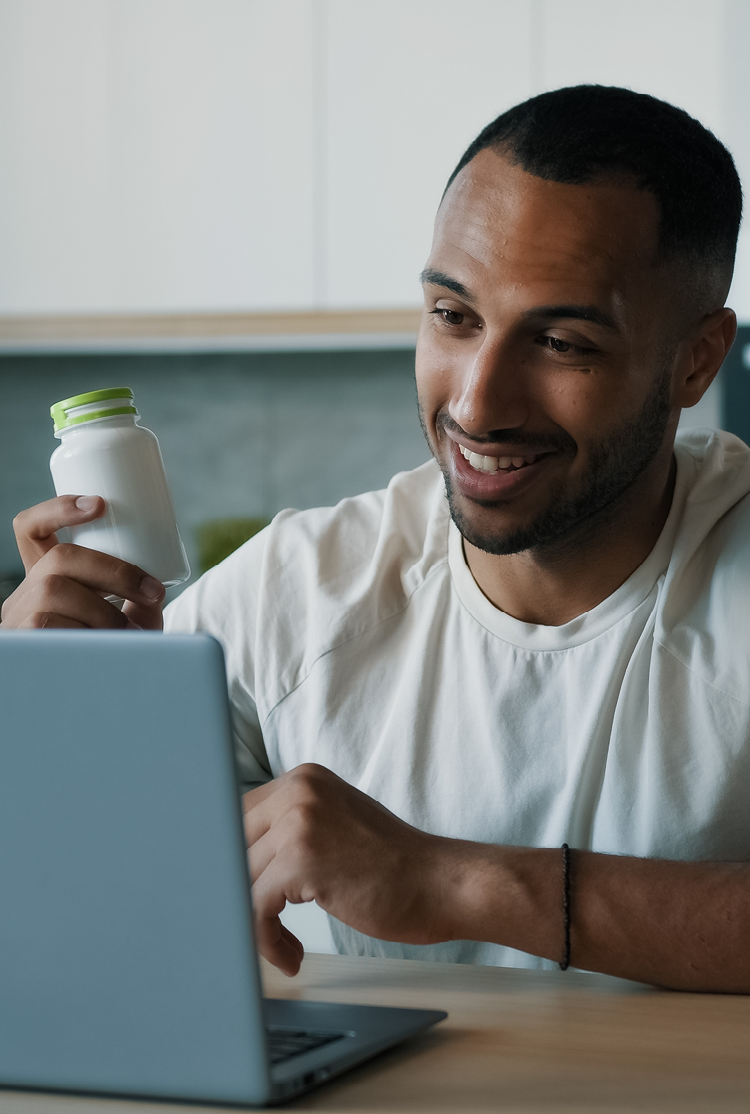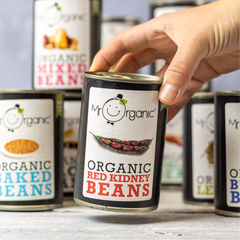10% off £25 OR 15% off £35

Your body goes through many changes when you’re pregnant, some desirable (hello, thicker hair!) and some less so (heartburn, anyone?). Many women find they suffer from acne during pregnancy even if they’ve never been prone to spots before. This can be more than a little frustrating, but try not to panic. It’s usually temporary and there are plenty of steps you can take to remedy it.
What is pregnancy acne?
Pregnancy acne is when pimples appear on your skin as a result of pregnancy. It’s thought that around half of all women get acne to some degree during pregnancy.
Often, pregnancy acne appears in women who have had acne at some point in their lives prior to becoming pregnant.
However, it’s not uncommon for pregnancy to be the first time a woman experiences acne.1
In some cases, women who experienced acne before pregnancy will see an improvement after conceiving. Of course, this is little comfort if you’re currently pregnant and battling the pimples. If you are experiencing pregnancy acne, try not to stress yourself out. It’s just one of the weird and wonderful ways your body responds to pregnancy and it’s likely to go away once your little one is born.
What causes pregnancy acne?
The short answer is – hormones! Hormones are responsible for most of the physical and emotional changes you experience during pregnancy, and pregnancy acne is no exception.
Pregnancy acne tends to appear during the first trimester, which is when your body ramps up production of the hormone progesterone. Progesterone can cause the sebaceous glands in your skin to secrete more sebum (oil) than usual.
This can cause blocked pores and a build-up of bacteria and dead skin cells along with the oil, which causes pimples, blackheads and whiteheads.2 Progesterone isn’t bad, though. In fact, it’s a key component of a healthy pregnancy.
Progesterone aids with the development of the foetus, strengthens the pelvic wall muscles in preparation for labour and helps milk production.3
Is acne common in early pregnancy?
Yes. Acne is most common in the first few weeks of pregnancy when the hormone progesterone is on the rise.
Acne early pregnancy usually improves as pregnancy progresses, but in some cases, spots can flare up throughout the entire nine months. Most often, it goes away after pregnancy – although this can take a little time.
Summary
- Acne in pregnancy is very common
- Pregnancy acne most often appears during the first trimester due to a surge in hormones
- During pregnancy, your sebaceous glands secrete more oil, leading to blocked pores and pimples
Where can you get pregnancy acne?
During pregnancy, acne can appear pretty much anywhere on the body where you have oil glands. These include:
-
Pregnancy acne on face
The most common place for an acne breakout during pregnancy is the face.
As the most visible area, this isn’t great news for mums-to-be, who may already be feeling a little self-conscious.
-
Chest acne during pregnancy
During pregnancy, your breasts increase in size so your bras might be fitting a little snugger.
This along with a bump in body temperature can make the pores in your breast area more prone to becoming blocked with sweat and oil.
-
Pregnant back acne
The same hormone surges which trigger acne on the face and chest in pregnancy can affect the skin on your back, too.
Skin on the upper back has lots of oil glands – which is why it’s a hotspot for blocked pores.4
-
Pregnancy acne on bump
As your bump grows, you might notice some pimples that weren’t there before.
This could be down to any creams, lotions or oils you may be using on your bump as a way to support the skin as it stretches.
If you’re not used to moisturising the skin on your stomach regularly, your pores may become blocked as a result.
Does pregnancy cause acne?
Pregnancy doesn’t always cause acne.
However, some women find that they’re seeing spots and pimples after getting that positive pregnancy test.
This is a result of hormonal changes during pregnancy, which are a natural and beneficial part of the process of growing a baby.
Acne by trimester
We'll take a look at how acne can appear throughout the different trimesters of pregnancy.
-
Acne first trimester
Weeks 0 – 12
Acne in early pregnancy is a concern for many women, and acne most commonly appears during the first three months of pregnancy.
This is due to strong hormonal surges triggering production of sebum – your skin’s natural oil.5
This can lead to blocked pores and pimples.
-
Acne second trimester
Weeks 13 – 28
In some women, the second trimester sees an easing of the acne that’s popped up during the first twelve weeks. This welcome relief is down to the pregnancy hormones stabilising, and sebum production returning to levels normal for you.
However, some women do see a continuation of the pimples during this trimester.
-
Acne third trimester
Weeks 29 – 40+
You may experience an improvement in pregnancy acne during the third trimester.
Progesterone levels peak around 32 weeks, while other hormones such as relaxin and prolactin ramp up.6
Unfortunately, an improvement in pregnancy acne is not guaranteed during the third trimester. Each woman is different and responds to pregnancy differently.
So much so in fact, that your skin’s reaction to one pregnancy might be completely different to how your skin responds during subsequent pregnancies!
Acne after pregnancy
The first three months of your baby’s life are often called the ‘fourth trimester’.
This is because your baby is going through a period of intense adjustment to life on the outside of the womb, and your body is also adjusting to no longer being pregnant. Some women find that they experience acne after delivering their baby. This may not be technically ‘pregnancy acne’, but the root cause is the same as what causes acne which occurs while you’re still pregnant.
Much like acne that strikes during pregnancy, post-partum acne is related to the hormonal changes taking place in your body.
After birth, the level of certain hormones including oestrogen and progesterone drop. This causes a gradual return to normality when it comes to certain pregnancy effects, for example swollen feet, raised body temperature and loose ligaments.7 However, hormonal changes can affect our skin, and you might find that the switch from pre to post-partum has acne flaring up again temporarily.
Lack of sleep, less time for a skincare routine and the stress of caring for a newborn may also have a part to play inn post-partum skin problems. Speak to your GP or health visitor if you’re concerned.
Summary
- Pregnancy acne can strike anywhere you have oil glands – including the face, breasts and back
- You can experience pregnancy acne at any point in your pregnancy
- Pregnancy acne usually goes away following delivery, but in some cases may linger
How to remedy acne during pregnancy
If you’ve suffered with acne before, you might feel that you can treat this new bout of acne by stocking up on products that you’ve used in the past. However, acne care during pregnancy requires a lighter touch.
Not only is your skin likely more sensitive, many common acne treatments are strictly off-limits during pregnancy.
This is because some chemicals used in acne treatments – both topical and oral – pose a risk to the unborn baby.
These risks include birth defects and an increased risk of miscarriage.8
Acne treatments which are unsuitable for use during pregnancy include:
- Oral retinoid medicines including acitretin, alitretinoin and isotretinoin. These are a strong synthetic form of vitamin A used to treat more severe acne.9
- Topical retinoids are less likely to cause harm to the unborn child. However, as a precaution, they must not be used during pregnancy and by women planning to have a baby.10
- Trimethoprim – an antibiotic sometimes used to treat acne.11 It may lower levels of folic acid in the blood and interfere with a baby’s healthy development.12
- Tetracycline – an antibiotic sometimes used to treat acne which can cause tooth discolouration in babies and bone growth issues.13
- Hydroquinone – this topical depigmenting agent is not advisable for use during pregnancy due to its high absorption rate.14
Acne-fighting ingredients which can be used during pregnancy include:
- Topical glycolic acid – an alpha hydroxy fruit acid which helps remove dead skin cells from the skin’s surface.15
- Topical salicylic acid – a beta hydroxy plant acid which acts as a mild exfoliant.16
- Benzoyl peroxide – an antiseptic which kills acne-causing germs on the skin’s surface.17
Always check with a healthcare professional first before starting any treatment.
Get advice from the experts
Some women decide to just let nature run its course and don’t actively do anything to treat their pregnancy-related spots and pimples. As a mum-to-be, it’s all about your choices and what you feel most comfortable with.
You might want to speak to an expert about which treatments they recommend.
You could speak to your GP, discuss options with your midwife or pop into a Holland & Barrett store and ask an associate for their recommendations.
How to prevent acne during pregnancy
In many cases, pregnancy acne just happens and despite your best efforts, is just part of the pregnancy package.
However, there are ways you can reduce your chances of a full-blown breakout:
-
Cleanse
Ultimately, you want to try and prevent your pores from getting blocked.
Take extra care washing your face every morning and night, making sure you use a mild cleanser that’s kind to your skin.
Don’t be tempted to scrub your face as this can cause your skin to become irritated.
-
Moisturise
Choose a non-comedogenic (pore-blocking), oil-free moisturiser and apply to the skin daily.
-
Wash
We’re sure this one is obvious, but a daily bath or shower will ensure your pores are clean and make pimples on the back and chest less likely.
-
Exfoliate
Exfoliate with a product containing glycolic or salicylic acid to help prevent blocked pores.
Exfoliating sloughs away the top layer of dead skin cells before they can settle into the pores and cause pimples.
-
Care for your hair
Mums-to-be often find that their hair changes during their pregnancy, becoming thicker and shinier thanks to an increase in the hormone oestrogen. During your pregnancy you might need to wash your hair more and replace your pillowcases more regularly.
If you have long hair, try putting it in a plait before bed to keep it off your face and stop any oil from your strands making their way onto your face and encouraging spots.
-
Eat and drink well
Your midwife will have already recommended you take multi-vitamins during your pregnancy but you should also try to eat foods that are rich in vitamins.
Fresh fruit and vegetables are good for both you and your baby, and a small amount of dark chocolate can help give your skin a boost. Make sure you’re hydrated by drinking lots of water, and avoiding coffee and tea as caffeine isn’t recommended during pregnancy.
-
Don’t stress
Easier said than done, we know. But stress produces the hormone cortisol, which can ramp up the production of oil in your skin.18 Take some time to relax and unwind during your pregnancy – you deserve it.
-
Try a homemade pregnancy acne remedy
Try a natural DIY approach to tackling pregnancy pimples.
A homemade face mask made with ingredients from your kitchen like honey, apple cider vinegar, yoghurt, lemon juice and mashed avocado can help cleanse and rebalance your skin naturally.
Summary
- Some common acne treatments – including retinoids – aren’t suitable for pregnancy. Your doctor or midwife can advise you further on this
- Glycolic acid, salicylic acid and benzoyl peroxide are suitable for topical use during pregnancy - please always check with a healthcare professional first
- A good diet, a gentle skincare routine and keeping stress at bay are key for promoting a clear complexion
- https://www.ncbi.nlm.nih.gov/pmc/articles/PMC5555287/
- https://www.whattoexpect.com/pregnancy/whose-body/acne.aspx
- https://www.yourhormones.info/hormones/progesterone/
- https://www.ncbi.nlm.nih.gov/pmc/articles/PMC3051853/
- https://www.todaysparent.com/pregnancy/pregnancy-health/how-pregnancy-hormones-affect-your-body-in-each-trimester/
- https://www.todaysparent.com/pregnancy/pregnancy-health/how-pregnancy-hormones-affect-your-body-in-each-trimester/
- https://www.todaysparent.com/pregnancy/pregnancy-health/how-pregnancy-hormones-affect-your-body-in-each-trimester/
- https://www.sciencedaily.com/releases/2016/04/160425141528.htm
- https://www.mountsinai.org/health-library/supplement/vitamin-a-retinol
- https://www.ema.europa.eu/en/documents/referral/retinoid-article-31-referral-updated-measures-pregnancy-prevention-during-retinoid-use_en-0.pdf
- https://bnf.nice.org.uk/drug/trimethoprim.html#pregnancy
- https://www.nhs.uk/medicines/trimethoprim/
- https://www.medicinesinpregnancy.org/Medicine--pregnancy/Tetracycline/
- https://www.ncbi.nlm.nih.gov/pmc/articles/PMC3114665/
- https://www.ncbi.nlm.nih.gov/pmc/articles/PMC3114665/
- https://www.ncbi.nlm.nih.gov/pmc/articles/PMC3114665/
- https://www.nhs.uk/medicines/benzoyl-peroxide/
- https://www.ncbi.nlm.nih.gov/pmc/articles/PMC4082169/



.png)










